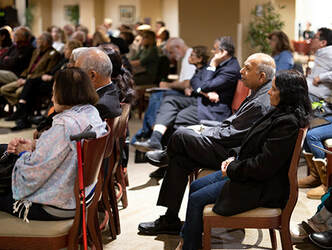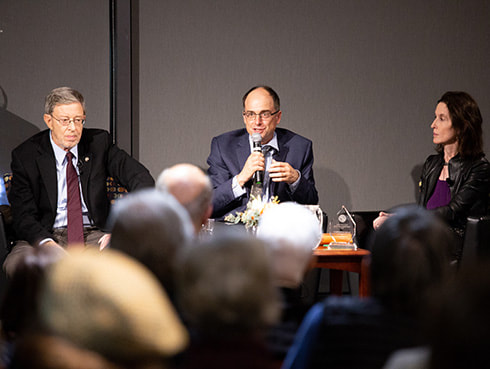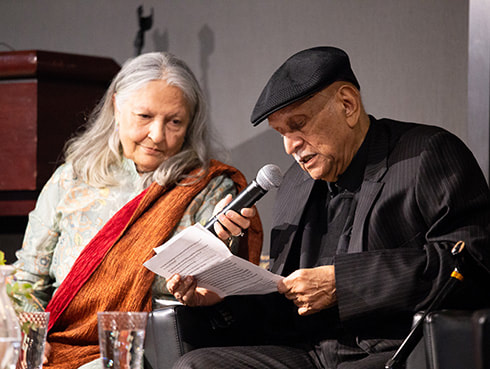By NIMMI RAGHUNATHAN
LOS ANGELES, CA – If your politics veers toward the conservative, it was not the place for you. On the other hand, if you sport liberal stripes, it might still not have been the place for you. It is this interesting ecosystem the husband and wife duo of Stephen F.Cohen and Katrina vanden Heuvel inhabit today.
LOS ANGELES, CA – If your politics veers toward the conservative, it was not the place for you. On the other hand, if you sport liberal stripes, it might still not have been the place for you. It is this interesting ecosystem the husband and wife duo of Stephen F.Cohen and Katrina vanden Heuvel inhabit today.

Joint winners of the 2019 Doshi Family Bridgebuilder Award, the two engaged in what was dubbed as a “conversational rather than presentational,” discussion on the ‘New US-Russia Cold War,’ at the annual event held at the Loyola Marymount University here on the evening of Feb.28.
DOSHIS
It began with Navin and Pratima Doshi speaking of the importance of bridge building and co-existence in a fraught world.Drawing on Buddhist history they touched on the philosophy of the Middle Path which reconciles and amalgamates ideas of moderation - and the great names associated with it including Siddhartha, Nagarjuna and Hiuen Tsang, pointing out that they were driven solely by the quest for Truth not riches or other benefits. The Doshis opined that Vanden Heuvel, who edits The Nation, shows the middle way in the ongoing tensions between Washington and Moscow and the voice of Cohen, where he explains the Russian perspective, in the age of a new cold war, remains an important one.
Cohen, who has just authored a new book, ‘War with Russia?’ is considered amongst the foremost of Russia scholars in the U.S. and his biography on the Bolshevik Nikolai Bukharin, a seminal one. Since that thoughtful work, he has been in the limelight counting, among others, Mikhail Gorbachev the last president of the Soviet Union, as a personal friend.
On being named for the Doshi award, Cohen, who is 80, said, he was surprised but on reflection felt he had indeed been bridgebuilding between the US and Russia for years: admittedly, in his own reckoning, speaking in a voice that is “unorthodox” and critics regard as pro-Kremlin. Vanden Heuvel, cheering on the relevance of the award said, “bridges not walls” needed to be of concern.
PUTIN AND TRUMP
The couple has resisted attempts to fall in line with mainstream thinking in what they say has been the “demonization” of Vladimir Putin, the Russian leader. This has raised the ire of conservatives who don’t like what they see as Russian belligerence and the re-emergence of a challenger to US world supremacy. When the duo takes it further and reject a Russian hand in the 2016 elections that gave the nation the most polarizing and arguably corrupt President ever in US history, they draw the wrath of the other side.
With Nigel Raab, professor of history at Loyola Marymount moderating, the couple explained their position and tried to reason why there was American hostility toward Putin. They referred to a statement made by the Russian president dismissing the idea of a unipolar world where there is one set of rules for the US and another for all other. Vanden Heuvel added another explanation. “The day after the 2016 elections which was a shock to the body politic,” she said, people working in the establishment “made a decision to make Russia a scapegoat for the election. It was a shift from complicated inquiry that was needed in a democracy.”
MILITARY
Speaking of the turbulent 90s, Vanden Heuvel said while Gorbachev had overseen the expansion of Glasnost, the de-democratization, the rise of oligarchs and corruption had happened under Boris Yeltsin. But the Clinton administration sowed the seeds for a new cold war by lauding Yeltsin as a democrat. Said Cohen, “Russia’s tragedy was the US’s triumph.” They couple argued that democracy might have been within reach in Russia, if Glasnost had been strengthened but they rued, “We never used the idea of Gorbachev.”
On Russian adventures in Crimea and Ukraine and whether Baltic nations like Estonia and Latvia were in danger of being swallowed by Putin, Cohen was dismissive saying he could not imagine a scenario where this would happen. Crimea has historically been Russian he said, but the West has chosen to ignore this as well as the Gallup polls of the local populace which favors the Russian connection. It was only the West that was choosing to make Crimea a festering wound in east-west relations. No one also talks, he said, about Putin’s mission when he came to power, which was to have economic development. With growing anger over salaries and pensions domestically, Putin, in Cohen’s thinking, was not going to be invading Estonia and creating additional burdens for himself.
In reference to NATO, the two were in agreement that the expansion of NATO has led to the new Cold War with Russia. Cohen got a laugh when he said, “I did not vote for Trump…He asks the right questions but does not know the answers,” in reference to the military grouping that the President has thumbed his nose at.
UNIVERSITY
The event which concluded with a reception also saw Roberta Espinoza, Vice Provost for Global-Local Initiatives speak briefly where she said Loyola Marymount has in its student body, several Russians and also runs a study abroad program to Moscow. Also present was Prof. Chris Chapple, Doshi Professor of Indic and Comparative Theology. The event concluded with book signing and a reception
DOSHIS
It began with Navin and Pratima Doshi speaking of the importance of bridge building and co-existence in a fraught world.Drawing on Buddhist history they touched on the philosophy of the Middle Path which reconciles and amalgamates ideas of moderation - and the great names associated with it including Siddhartha, Nagarjuna and Hiuen Tsang, pointing out that they were driven solely by the quest for Truth not riches or other benefits. The Doshis opined that Vanden Heuvel, who edits The Nation, shows the middle way in the ongoing tensions between Washington and Moscow and the voice of Cohen, where he explains the Russian perspective, in the age of a new cold war, remains an important one.
Cohen, who has just authored a new book, ‘War with Russia?’ is considered amongst the foremost of Russia scholars in the U.S. and his biography on the Bolshevik Nikolai Bukharin, a seminal one. Since that thoughtful work, he has been in the limelight counting, among others, Mikhail Gorbachev the last president of the Soviet Union, as a personal friend.
On being named for the Doshi award, Cohen, who is 80, said, he was surprised but on reflection felt he had indeed been bridgebuilding between the US and Russia for years: admittedly, in his own reckoning, speaking in a voice that is “unorthodox” and critics regard as pro-Kremlin. Vanden Heuvel, cheering on the relevance of the award said, “bridges not walls” needed to be of concern.
PUTIN AND TRUMP
The couple has resisted attempts to fall in line with mainstream thinking in what they say has been the “demonization” of Vladimir Putin, the Russian leader. This has raised the ire of conservatives who don’t like what they see as Russian belligerence and the re-emergence of a challenger to US world supremacy. When the duo takes it further and reject a Russian hand in the 2016 elections that gave the nation the most polarizing and arguably corrupt President ever in US history, they draw the wrath of the other side.
With Nigel Raab, professor of history at Loyola Marymount moderating, the couple explained their position and tried to reason why there was American hostility toward Putin. They referred to a statement made by the Russian president dismissing the idea of a unipolar world where there is one set of rules for the US and another for all other. Vanden Heuvel added another explanation. “The day after the 2016 elections which was a shock to the body politic,” she said, people working in the establishment “made a decision to make Russia a scapegoat for the election. It was a shift from complicated inquiry that was needed in a democracy.”
MILITARY
Speaking of the turbulent 90s, Vanden Heuvel said while Gorbachev had overseen the expansion of Glasnost, the de-democratization, the rise of oligarchs and corruption had happened under Boris Yeltsin. But the Clinton administration sowed the seeds for a new cold war by lauding Yeltsin as a democrat. Said Cohen, “Russia’s tragedy was the US’s triumph.” They couple argued that democracy might have been within reach in Russia, if Glasnost had been strengthened but they rued, “We never used the idea of Gorbachev.”
On Russian adventures in Crimea and Ukraine and whether Baltic nations like Estonia and Latvia were in danger of being swallowed by Putin, Cohen was dismissive saying he could not imagine a scenario where this would happen. Crimea has historically been Russian he said, but the West has chosen to ignore this as well as the Gallup polls of the local populace which favors the Russian connection. It was only the West that was choosing to make Crimea a festering wound in east-west relations. No one also talks, he said, about Putin’s mission when he came to power, which was to have economic development. With growing anger over salaries and pensions domestically, Putin, in Cohen’s thinking, was not going to be invading Estonia and creating additional burdens for himself.
In reference to NATO, the two were in agreement that the expansion of NATO has led to the new Cold War with Russia. Cohen got a laugh when he said, “I did not vote for Trump…He asks the right questions but does not know the answers,” in reference to the military grouping that the President has thumbed his nose at.
UNIVERSITY
The event which concluded with a reception also saw Roberta Espinoza, Vice Provost for Global-Local Initiatives speak briefly where she said Loyola Marymount has in its student body, several Russians and also runs a study abroad program to Moscow. Also present was Prof. Chris Chapple, Doshi Professor of Indic and Comparative Theology. The event concluded with book signing and a reception



 RSS Feed
RSS Feed
